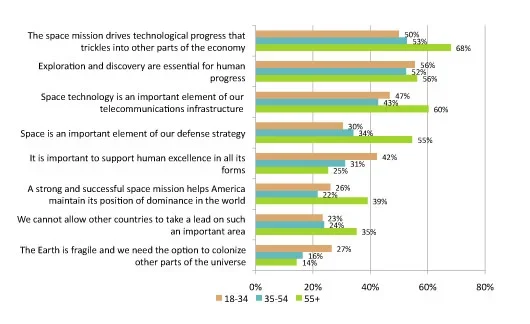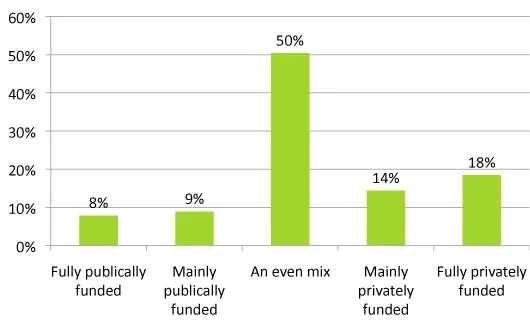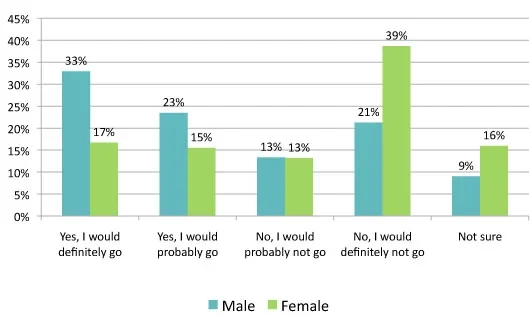Since the creation of NASA in 1958, the United States has a long and prominent history of space exploration. But with the economy facing austerity measures in recent years and developing countries such as India joining the race to land a manned mission on Mars, is there still a place for the US in space?
Americans say yes. 94% of adult Americans surveyed feel it is important that NASA and the US space program are maintained. While any level of importance is felt equally across genders, men are more likely to have strength in the opinion with one in three (32%) stating it is extremely important for the United States to maintain NASA compared with one in four (23%) women.
Reasons why the public believe it is important to maintain the space program vary strongly with age. Younger respondents (aged 18 to 34) focus on the idea of human excellence generally or the environmental issues they may encounter in their lifetimes. Respondents who are older (55 and over) – and lived through the original space race and cold war - are more likely to highlight defence issues such as strategy or global dominance.
Which of the following statements best describe why it is important for the United States to maintain the National Aeronautics and Space Administration (NASA) and the United States space program?

So how much should we be funding NASA? Their 2014 budget has been set at $16 billion, the lowest since 2007. Overall, four in ten (39%) Americans think this is about right with almost the same proportion (38%) saying this is too low. Just under one in four (23%) feel this is too high.
Gender plays an interesting part again here, with almost half (47%) of men stating this is too low compared with 29% of women.
One alternative to the public funding of space missions is for to encourage the private sector to stump up some of the cash. This view is popular among America, with half (50%) of adults stating that space exploration should be funded equally from public funds and private cash through companies such as Virgin Galactic and SpaceX. A further one in seven (14%) feel space exploration should be mainly funded privately and 18% think private companies should fully fund it.
Do you think space transportation and exploration should be funded by publically funded organizations or private companies such as SpaceX or Virgin Galactic?

Countries that may have been considered “third world” at the start of the space race in the 1960s now have space programs of their own. India, for example, recently launched a spacecraft to Mars in hopes of becoming the fourth space agency to reach the planet.
This has been seen as controversial in some quarters as the country still receives international aid from Western countries such as the US and the UK. In fact, 27% of those surveyed stated that net receivers of international aid should not be spending money on space exploration. Nearly the same proportion (28%), however, stated that the more countries get involved in space exploration, the faster it will progress. Additionally, one in three (33%) said that it is not our place to comment on how other countries allocate their budgets.
Reaching Mars in an unmanned mission is one thing, but how long until we can land people on the planet? Two-thirds (66%) of the public believe this will happen in the next 50 years – more than two in five (44%) believe we are a maximum of 20 years off. Around on in five (22%) believe this will never happen, however, with women being more sceptical than men (29% stating this compared with 15% of men).
Finally – given the opportunity to take a space flight free of costs, would you go? Just one in four (25%) of the public said they definitely would, a further 19% stating they probably would. The gender divide is as strong here as with other thoughts on space with one in three (33%) of men saying definitely compared with just 17% of women.
If you were given the opportunity to take a space flight free of costs would you go on it?

For further information about poll results, and for details about methodology and omnibus services, please email omnibus.us@yougov.com.
Find the full results here.
Image: Getty








